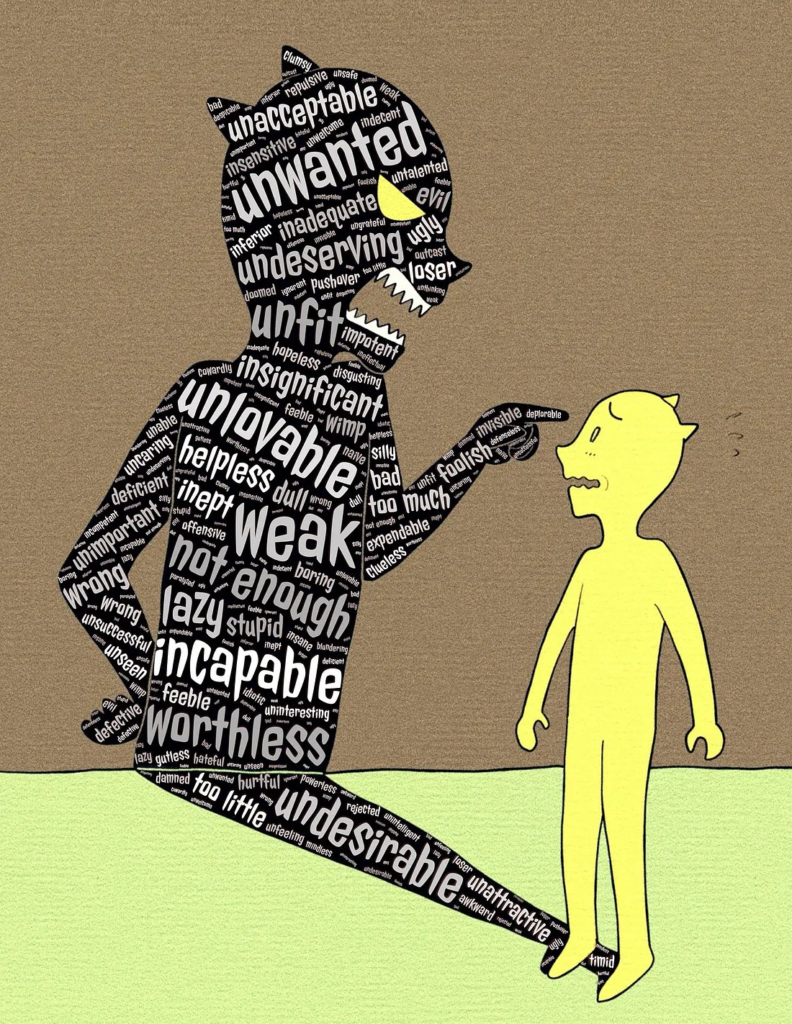Most of us have an inner critic—that nagging voice that twists our achievements and second-guesses our aspirations. I know mine well. For years, I believed its harsh words were truth. But what if our inner critic isn’t the enemy? This article explores when it shows up, why it exists (yes, it has value!) and, most importantly, how to quiet its grip and reclaim your power. And right now, as external pressures amplify self-doubt, learning to manage this voice is more crucial than ever. Let’s dive in and shift the narrative.

Life gets better when you’re kind to yourself!

“Begin by discovering how your mind operates by noticing the stories that form in your thoughts.”
Making peace with critics and embracing yourself!
I used to be my own worst critic. I’d compare myself to others and almost always come up short—less attractive, less articulate, less capable. That internal dialogue was relentless, and over time, it chipped away at my confidence. What I didn’t realize back then was how much of that pain was self-inflicted. I was too caught up in my insecurities to recognize the unique gifts I had to offer just by being me.
Learning to befriend myself!
The biggest challenge in my journey toward self-acceptance has been the way I treat myself. I began to offer myself the same kindness and compassion that I naturally extend to others. Instead of battling my inner critic, I took the time to understand it. This shifted my perspective and allowed me to cultivate a more nurturing relationship with myself. While my life is still a work in progress and doubts occasionally creep in, the inner turmoil has significantly lessened. Embracing this new approach has been transformative and has paved the way for a more peaceful existence.
Meeting the inner critic!
For the longest time, I thought there was something fundamentally wrong with me. Not only did I judge myself harshly, but I also caught my mind criticizing the people I loved. The shame was overwhelming. When I finally opened up to my therapist, I expected her to be horrified. Instead, she reassured me: You are not alone. Many people experience this.
She explained that the inner critic, though harsh, originally developed as a defense mechanism—trying to protect me from rejection, failure, and pain. It had simply become too loud and overpowering. Through an exercise with a therapist, I visualized this voice and, surprisingly, ended up drawing a little girl sitting by the water edge to represent it. My therapist encouraged me to place that drawing somewhere visible as a reminder: You are not your inner critic. You don’t have to believe everything it says.
That changed everything. For the first time, I saw the critic as just one voice in my mind—not an absolute truth.
There’s nothing wrong with us!
That realization was liberating. I wasn’t broken. I wasn’t doomed to be consumed by self-judgment. If you’ve ever felt like your inner critic defines you, I want you to know it doesn’t. And talking about it, bringing it into the light, helps to dissolve the shame around it.
Becoming aware of the stories we tell ourselves!
Another turning point for me came when I started meditating. I attended a four-day silent retreat where we practiced different meditation techniques for ten hours a day. It was intense. At times, emotions overwhelmed me, and I found myself crying uncontrollably. But instead of trying to suppress those emotions, the retreat leader encouraged me to observe them. What story is playing in your mind right now?
I started noticing a pattern: my strongest emotions were triggered by past wounds or fears of an imagined future. My mind was constantly spinning stories, and I had been blindly believing them. But when I simply observed these thoughts instead of engaging with them, they lost their grip on me.
Understanding the repetitive nature of the mind!
Our minds love to replay the same painful narratives. If I keep telling myself I’m not good enough, those words will generate painful emotions. If I don’t recognize them as just thoughts, I’ll engage with them—arguing, believing, or feeling defeated by them. And the more I engage, the stronger they become.
Naming the mind’s favorite stories!
Meditation teacher Pritham Khalsa speaks about recognizing the “Top Tunes” of our minds—the recurring thought patterns and narratives we unknowingly replay. These stories shape our perceptions, influencing how we see ourselves and the world.
For me, one of the most persistent mental soundtracks was comparison. My mind had a habit of whispering (or sometimes shouting), You’re not enough. Not as talented. Not as successful. Not as worthy. It was a familiar tune, one I had internalized for years without realizing how much power it held over me.
But then something shifted. I named it. I started noticing when the comparison story played in my mind. Instead of accepting it as truth, I acknowledged it with curiosity: Oh, hello, comparison voice. You’re back again.
And something amazing happened. By naming it, I created distance. It no longer defined me. It was just a thought—a well-worn track my mind liked to play—but it wasn’t me. I didn’t have to dance to its tune anymore.
Recognizing and naming your mind’s favorite stories is a powerful step toward reclaiming your inner peace. When you bring awareness to these thought patterns, you weaken their grip. They may still show up, but they no longer control the narrative.
Letting go of judging the judging mind!
Here’s the tricky part: once we become aware of our thoughts, we sometimes fall into the trap of judging ourselves for having them. In Buddhism, they talk about the “two arrows.” The first arrow is the pain we naturally experience—rejection, criticism, sadness. The second arrow is the suffering we create for ourselves—self-judgment, resistance, or shame about feeling that pain. The key to reclaiming our power is this: we don’t have to shoot the second arrow. We can choose not to add unnecessary suffering by resisting what is.
Owning your personal power!
True power isn’t about silencing our thoughts or forcing our minds into submission—it’s about not letting them control us. The mind is like a river, constantly flowing with thoughts, emotions, and stories. That’s its nature. We can’t stop the current, but we can decide whether to get swept away or simply watch it pass.
Owning your personal power means recognizing that not every thought deserves your attention. Some thoughts uplift and inspire, while others tear you down or keep you stuck in self-doubt. The key is learning to discern which thoughts serve you and which ones don’t.
Instead of reacting automatically, pause. Observe. Ask yourself: Does this thought empower me or hold me back? If it’s not helping, let it go. You don’t have to fight it, suppress it, or judge yourself for having it. Just release it, like a leaf floating down a stream.
The moment you realize you are not your thoughts, you are the observer, the chooser, and you reclaim your power. And with that power comes freedom. Freedom to rewrite your inner narrative, to show up as your true self, and to live a life that aligns with who you truly are.
Nurturing a kinder relationship with ourselves!
As I started observing my thoughts instead of being consumed by them, I felt a shift. The negative beliefs that had once seemed so real began to loosen their grip. It takes practice, but there’s nothing more valuable than learning to relate to ourselves with kindness and understanding. How we treat ourselves shapes every other aspect of our lives.
So, here’s my invitation to you: Start paying attention to the stories running through your mind. You might be surprised by what you find. And when you do, remember—you are not your inner critic. You are far more than the thoughts that pass through your mind. You are worthy, just as you are.
As you begin this journey of self-awareness, approach it with curiosity rather than judgment. Notice the patterns that emerge, the narratives that replay, and the emotions they stir. Instead of resisting them, acknowledge them with kindness. Over time, you’ll see that these thoughts are not facts, nor are they fixed truths about who you are.
Give yourself permission to rewrite the script. Replace self-criticism with self-compassion. Remind yourself that growth happens in moments of awareness, in the pauses where you choose to respond differently. It’s not about silencing the inner critic entirely—it’s about learning to live in harmony with it without letting it define you.
So take a breath, tune in, and trust that you are enough. Not because of what you achieve, not because of what others think, but simply because you exist. And that, in itself, is more than enough.
Wise Words!
So, here’s my invitation to you. Start paying attention to the stories running through your mind. You might be surprised by what you find. And when you do, remember—you are not your inner critic. You are far more than the thoughts that pass through your mind. You are worthy, just as you are. As you begin this journey of self-awareness, approach it with curiosity rather than judgment. Notice the patterns that emerge, the narratives that replay, and the emotions they stir. Instead of resisting them, acknowledge them with kindness. Over time, you’ll see that these thoughts are not facts, nor are they fixed truths about who you are.